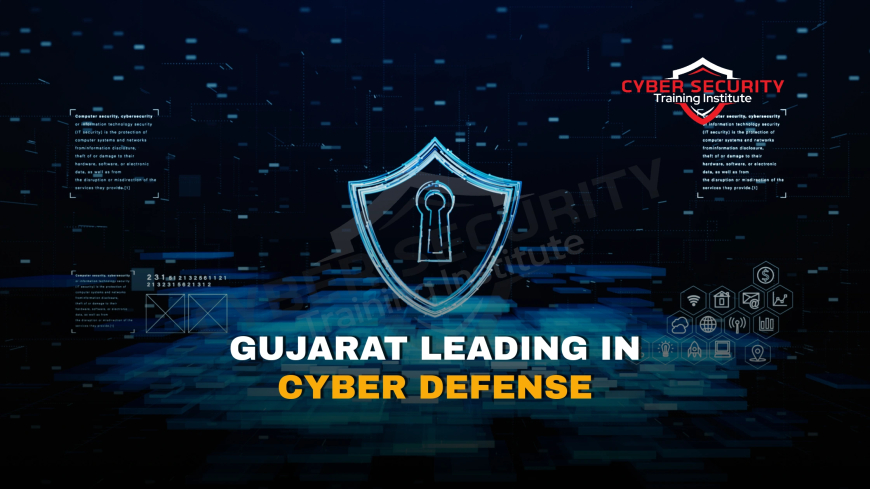Building Cyber Forts | Gujarat’s Journey to Becoming a Cyber Secure State
In today’s digital age, where our lives are increasingly intertwined with technology, the threat of cyberattacks looms larger than ever. From phishing scams to ransomware, cybercriminals are finding new ways to exploit vulnerabilities. Gujarat, a vibrant state in India known for its entrepreneurial spirit and rapid development, is taking bold steps to fortify its digital landscape. This blog post explores Gujarat’s journey to becoming a cyber-secure state, highlighting the initiatives, challenges, and strategies that are shaping its cybersecurity ecosystem. Whether you’re a business owner, a student, or just someone curious about staying safe online, this guide will walk you through Gujarat’s efforts to build robust "cyber forts" to protect its citizens and businesses.

Table of Contents
- The Growing Need for Cybersecurity in Gujarat
- Key Cybersecurity Initiatives in Gujarat
- Cybersecurity Education and Training
- The Role of Cybersecurity Companies
- Challenges in Building a Cyber-Secure State
- The Future of Cybersecurity in Gujarat
- Conclusion
- Frequently Asked Questions
The Growing Need for Cybersecurity in Gujarat
Gujarat is a hub of economic activity, with thriving industries in manufacturing, IT, and finance. As businesses and individuals increasingly rely on digital platforms, the risk of cyber threats grows. Cybercrime, such as online fraud, data breaches, and identity theft, can cause financial losses and erode trust. According to recent statistics, India faces millions of cyber incidents annually, with Gujarat being no exception due to its rapid digitization. The state’s government and private sector are recognizing that a strong cybersecurity framework is essential to protect sensitive data and maintain economic growth.
The rise of online banking, e-commerce, and digital governance has made cybersecurity a priority. For instance, Gujarat’s push for smart cities and digital infrastructure under initiatives like Digital India demands robust protection against cyber threats. This section sets the stage for understanding why Gujarat is investing heavily in cybersecurity and how it’s working to safeguard its digital future.
Key Cybersecurity Initiatives in Gujarat
Gujarat has launched several initiatives to strengthen its cybersecurity posture. These efforts involve collaboration between the government, police, and private organizations. Below are some of the key programs driving Gujarat’s journey to becoming a cyber-secure state:
- Cyber Nodal by Gujarat Police: The Gujarat Police’s Cyber Nodal division provides a single-window platform for reporting cybercrimes. It streamlines the process for citizens to file complaints and seek assistance for issues like online fraud or cyberbullying. The portal allows investigating officers to submit cooperation requests, ensuring quick action against cybercriminals.
- https://cybernodal.gujarat.gov.in
- Cyber Crime Incident Response Unit (IRU): This unit offers immediate support for victims of cybercrimes, such as credit card fraud or identity theft. By dialing helplines like 100 or 112, citizens can connect with experts who provide technical and legal guidance to mitigate losses.
- https://gujaratcybercrime.org/eng
- Cyber Crime Prevention Unit (CCPU): The CCPU focuses on analyzing cyber threats and educating both police and citizens. It maintains a database of financial fraud cases and works to prevent future incidents through awareness campaigns.
- https://gujaratcybercrime.org/eng
- Digital Security Kiosks: Gujarat Police has introduced kiosks where citizens can assess the security of their devices, such as smartphones and tablets. These kiosks help individuals identify vulnerabilities and take preventive measures.
- https://gujaratcybercrime.org/eng
- NIC-CERT Division: The National Informatics Centre’s CERT division in Gujarat coordinates responses to cybersecurity incidents affecting government infrastructure. It provides threat intelligence and advisories to protect public systems.
- https://guj.nic.in/service/security
These initiatives reflect Gujarat’s proactive approach to tackling cybercrime and fostering a secure digital environment.
Cybersecurity Education and Training
Education is a cornerstone of Gujarat’s cybersecurity strategy. The state is home to numerous colleges and training institutes offering specialized cybersecurity courses. These programs equip students and professionals with the skills needed to combat cyber threats. Below is a table highlighting some of the top cybersecurity colleges in Gujarat:
| College Name | Location | Courses Offered |
|---|---|---|
| Gujarat University | Ahmedabad | BCA, MCA with Cybersecurity |
| Rai University | Ahmedabad | MBA with Cybersecurity Specialization |
| EyeQ Dot Net | Vadodara | Certified Ethical Hacker, Internships |
https://www.eyeqdotnet.com/cyber-security-training-and-internship-in-gujarat
https://collegedunia.com/science/cyber-security/gujarat-colleges
These institutions offer courses in areas like ethical hacking, network security, and penetration testing. Programs like those at EyeQ Dot Net provide hands-on training and internships, preparing students for roles such as cybersecurity analysts and penetration testers. With salaries for cybersecurity professionals in Gujarat ranging from $71,000 to $150,000 annually, these programs are opening doors to lucrative careers.
https://www.eyeqdotnet.com/cyber-security-training-and-internship-in-gujarat
The Role of Cybersecurity Companies
Gujarat’s private sector is also playing a pivotal role in building a cyber-secure state. Several cybersecurity companies are based in the state, offering innovative solutions to combat cyber threats. Here are some notable players:
- Synersoft Technologies: Provides data security and backup solutions for businesses, focusing on network security and systems integration.
- https://www.f6s.com/companies/cyber-security/india/gujarat/no
- VP Techno Labs International: Known for advanced penetration testing and vulnerability assessments, this company offers a data breach warranty, ensuring client confidence.
- https://www.f6s.com/companies/cyber-security/india/gujarat/no
- Positiwise Software Pvt Ltd: Develops next-generation software with a focus on cybersecurity, helping businesses optimize their digital operations.
- https://www.f6s.com/companies/cyber-security/india/gujarat/no
- Aaizel Tech: Specializes in cybersecurity platforms for various sectors, including defense and IT, using AI and machine learning to enhance security.
- https://www.f6s.com/companies/cyber-security/india/gujarat/no
- Secure Smith: Offers customized cybersecurity solutions for businesses of all sizes, addressing threats like phishing and ransomware.
- https://www.f6s.com/companies/cyber-security/india/gujarat/no
These companies are not only protecting businesses but also creating job opportunities and fostering innovation in Gujarat’s cybersecurity ecosystem.
Challenges in Building a Cyber-Secure State
Despite its progress, Gujarat faces several challenges in its cybersecurity journey:
- Lack of Awareness: Many citizens and small businesses lack knowledge about basic cybersecurity practices, such as using strong passwords or recognizing phishing emails.
- Skill Shortage: The demand for cybersecurity professionals outstrips supply, making it difficult to fill critical roles.
- Evolving Threats: Cybercriminals are constantly developing new techniques, requiring continuous updates to security measures.
- Resource Constraints: Smaller organizations often lack the budget to invest in advanced cybersecurity tools.
Addressing these challenges requires a multi-pronged approach, including public awareness campaigns, increased investment in education, and collaboration between government and industry.
The Future of Cybersecurity in Gujarat
Gujarat’s vision for a cyber-secure future is ambitious yet achievable. The state is investing in emerging technologies like artificial intelligence and machine learning to detect and prevent cyber threats. Public-private partnerships are being strengthened to foster innovation and share resources. Additionally, initiatives like the CCPU are focusing on creating a "cybersecurity culture" where citizens and businesses prioritize digital safety.
As Gujarat continues to grow as a digital hub, its efforts to build cyber forts will serve as a model for other states. By combining education, technology, and proactive governance, Gujarat is paving the way for a secure digital future.
Conclusion
Gujarat’s journey to becoming a cyber-secure state is a testament to its forward-thinking approach. Through initiatives like Cyber Nodal, IRU, and CCPU, the state is addressing cyber threats head-on. The growth of cybersecurity education and the contributions of private companies are further strengthening its defenses. While challenges remain, Gujarat’s commitment to building a robust cybersecurity ecosystem is clear. By fostering awareness, training professionals, and leveraging technology, Gujarat is not just protecting its digital assets but also setting an example for others to follow. As we move further into the digital age, Gujarat’s cyber forts will stand tall, safeguarding its citizens and businesses from the ever-evolving threats of the online world.
Frequently Asked Questions
What is cybersecurity?
Cybersecurity involves protecting computers, networks, and data from unauthorized access or attacks, ensuring safety in the digital world.
Why is cybersecurity important for Gujarat?
As a hub for business and digital growth, Gujarat needs strong cybersecurity to protect sensitive data and maintain economic stability.
What is the Cyber Nodal portal?
It’s a Gujarat Police platform for reporting cybercrimes and seeking assistance, streamlining the process for victims and investigators.
How can I report a cybercrime in Gujarat?
You can dial 100 or 112 to reach the Cyber Crime Incident Response Unit or use the Cyber Nodal portal to file a complaint.
What is the Cyber Crime Incident Response Unit (IRU)?
The IRU provides immediate technical and legal support to victims of cybercrimes like fraud or identity theft.
What does the Cyber Crime Prevention Unit (CCPU) do?
The CCPU analyzes cyber threats, educates citizens and police, and maintains a database to prevent financial fraud.
Are there cybersecurity courses in Gujarat?
Yes, colleges like Gujarat University and Rai University offer courses in cybersecurity, ethical hacking, and network security.
What kind of jobs are available in cybersecurity in Gujarat?
Roles include cybersecurity analysts, penetration testers, and application security engineers, with salaries ranging from $71,000 to $150,000 annually.
Who are the major cybersecurity companies in Gujarat?
Companies like Synersoft Technologies, VP Techno Labs, and Positiwise Software provide innovative cybersecurity solutions.
What are digital security kiosks?
These are Gujarat Police kiosks where citizens can check the security of their devices, like smartphones, to identify vulnerabilities.
How is the government supporting cybersecurity in Gujarat?
The government supports cybersecurity through initiatives like Cyber Nodal, IRU, CCPU, and the NIC-CERT division.
What challenges does Gujarat face in cybersecurity?
Challenges include lack of awareness, skill shortages, evolving threats, and limited resources for smaller organizations.
How can businesses in Gujarat protect themselves from cyber threats?
Businesses can use strong passwords, regular software updates, employee training, and services from cybersecurity firms.
What is a phishing scam?
A phishing scam is when cybercriminals send fake emails or messages to trick people into sharing personal information.
Can individuals benefit from cybersecurity training?
Yes, training helps individuals recognize threats, secure devices, and pursue careers in cybersecurity.
What role does AI play in Gujarat’s cybersecurity?
AI is used by companies like Aaizel Tech to detect and prevent cyber threats more effectively.
How does Gujarat promote a cybersecurity culture?
Through awareness campaigns, education, and initiatives like the CCPU, Gujarat encourages safe digital practices.
Are there internships for cybersecurity in Gujarat?
Yes, companies like EyeQ Dot Net offer internships for hands-on cybersecurity experience.
What is penetration testing?
Penetration testing involves simulating cyberattacks to identify and fix vulnerabilities in systems or networks.
How can I stay updated on cybersecurity threats in Gujarat?
Follow updates from Gujarat Police, NIC-CERT, or enroll in training programs to stay informed.
What's Your Reaction?
 Like
0
Like
0
 Dislike
0
Dislike
0
 Love
0
Love
0
 Funny
0
Funny
0
 Angry
0
Angry
0
 Sad
0
Sad
0
 Wow
0
Wow
0














